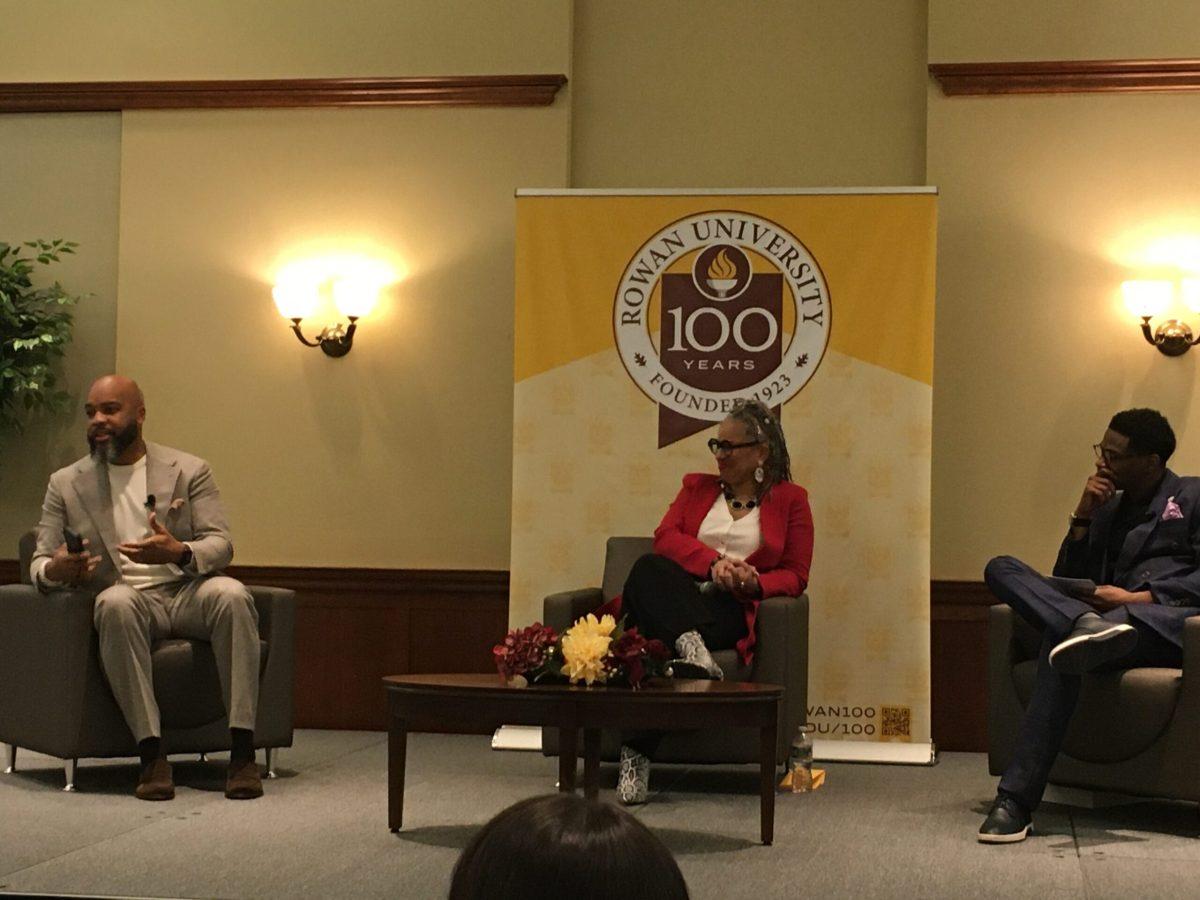The 19th Annual Rosa Parks Scholarship Luncheon was held on Feb. 27 with keynote speaker Trymaine Lee. While at Rowan, he wrote for The Whit and was active in the Black Student Union.
The theme was Amplifying African American Voices Through the Arts and Politics. As guests entered and found their seats, a video tribute to Rosa Parks’s life and achievements was played on the two large screens at the front of the ballroom, followed immediately by a montage of the histories of different music genres and the influence black Americans had on each of them.
Since graduating with a bachelor’s degree in journalism in 2003, Lee has contributed to reporting projects about Hurricane Katrina and the Eliot Spitzer scandal that have won Pulitzer Prizes, contributed to the New York Times’ “1619 Project,” and won an Emmy for his hour-long MSNBC special on gun violence in Chicago. He has worked for the New York Times, and Huffington Post and is currently a correspondent for MSNBC, with a podcast called “Into America.”
“Rowan played such a formative role in my career, my life. So it’s a special place for me. I really honed my journalism chops here. I got the chance to spread my wings under the tutelage of Katherine Quigley… she’s hilarious and just a really good professor… I hope to really connect students and attendees to the bigger ideas about life that we’ve experienced and the way we capture it in journalism, and the stories that we choose to tell and who we center in those stories,” said Lee.
The event began with an introduction of the Master of Ceremonies Alicia Monroe, Ed.D., who teaches classes and leads research on issues of diversity, equity, and inclusion at Rowan, as well as designing a course called “Black Lives Matter: An Ethnographic Perspective of the Movement.”
Winslow Township High School’s Concert Choir attended to provide the luncheon’s music, singing “Lift Every Voice and Sing” as well as “Like a River in My Soul.”
The choir got a special shoutout from SGA President Brianna Reagan in her speech, who is an alum of the high school herself before she moved on to describing the life and legacy of Rosa Parks.
“I used to bleed green and white before I bled brown and gold, just to make sure everyone knows,” said Reagan. “Rosa Parks was not merely a passenger who refused to give up her seat. She was a beacon of hope and a catalyst of change in a nation that was plagued by segregation and injustice.”
Moses Possible, a senior music major, gave a vocal performance as well, accompanied by Sean Baker on piano.
After the musical performances had ended, the Rosa Parks Committee took the time to honor the life of Dr.Barbara Chamberlain, who was a Board of Trustees member and had served on the committee in 2015 and was reappointed in 2020. Chamberlain passed away last summer, and in honor of her work and service for the Rowan community, the committee sent her family a memorial plaque.
Lunch, provided by Gourmet Dining, was served buffet style, with one row of tables being sent up to serve themselves food at a time. Guests had the options of chicken marsala, vegetarian lasagna, green beans, garlic mashed potatoes, and salad, with slices of carrot cake and fruit salad available for dessert.
After everyone had their plates of food, Michael Nash, a Rowan alum and former MoCA president who is now working as a strategic systems analyst at the university, introduced Trymaine Lee. Lee joined Monroe and Nash on the chairs set up on the stage for the main discussion of the luncheon, which largely focused on race, economics, and division in the US.
“And so I would argue that black Americans in particular have not achieved any level of full citizenship yet. That’s why every election cycle, you’ll see the fight against voter ID laws and gerrymandering. We have to fight for our rights at every single turn,” said Lee.
Polls were put on the screens asking the audience what issue they felt was most important in the current moment. The two most voted-for options were “partisan politics,” with 28% of the vote, and “erosion of DEI,” with 30%.
Nick Williams is a student who was in attendance at the luncheon.
“As a history major, I think he offered a lot of really good insight on things that we don’t often learn about, and what we can do to kind of bridge the gap between certain things that often aren’t part of what we traditionally learn about, especially with black history,” said Williams.
As they discussed these topics, they went into detail about lessons from history, with Lee saying that he first began getting interested in the way systems work and the way stories about those systems and the people within them are told when the MOVE bombing occurred in Philadelphia.
As the conversation continued, Lee, Monroe, and Nash all spoke on how history continues to affect the modern day and what responsibility lies with voters, young people, and journalists to use their knowledge to make change in the world.
For comments/questions about this story DM us on Instagram @thewhitatrowan or email [email protected]

























































































































































!["Working with [Dr. Lynch] is always a learning experience for me. She is a treasure,” said Thomas. - Staff Writer / Kacie Scibilia](https://thewhitonline.com/wp-content/uploads/2025/04/choir-1-1200x694.jpg)









































